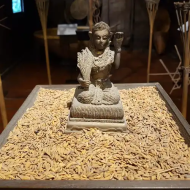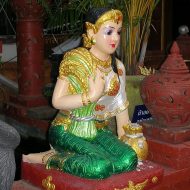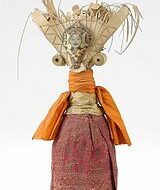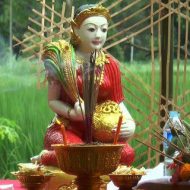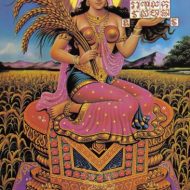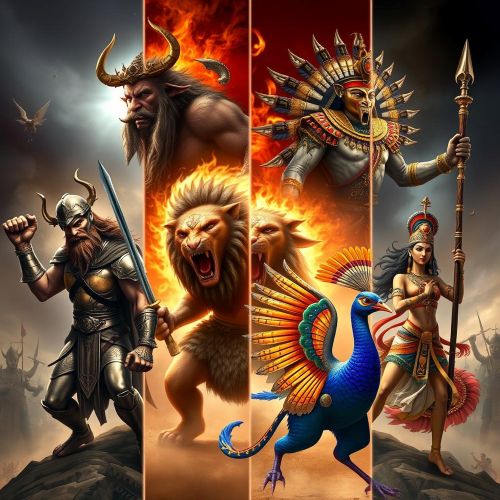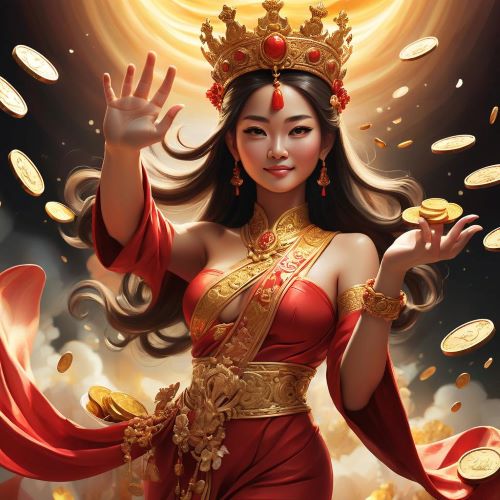Phosop : The Rice Goddess
Listen
At a glance
| Description | |
|---|---|
| Origin | Thai Mythology |
| Classification | Gods |
| Family Members | Isvara (Father), Suwanna Paijit, Sri Dokmai (Children) |
| Region | Thailand |
| Associated With | Rice, Agriculture, Food |
Phosop
Introduction
One of the most popular rice goddesses in the ancient Thai religion is Phosop. Although she is still honoured today, she is mainly regarded as an ancient deity instead of a part of the mainstream religion. This means that her worship has mostly been relegated to rice growing regions.
In Thai culture, the rice goddess is known as Mae Posop, and she is regarded as a powerful deity who can help harvest the rice. Since she is a shy and easily frightened individual, no men are allowed to approach her before the harvest begins. A miscarriage among women might also occur during this period due to her fear.
Physical Traits
Phosop is usually depicted as a beautiful woman wearing a traditional jewellery set. She is usually shown wearing a green or red dress in order to represent the harvest’s fertility. She is also depicted sitting or standing and holds a rice sheaf on either her right shoulder or against her right arm.
The images of Phosop are based on ancient customs and local traditions. However, in modern times, the modern depiction of the rice goddess is mainly based on a Hindu goddess known as Devi. In smaller regions, a young woman from a village can be considered as Phosop in order to represent her in various festivals.
Family
In Thai mythology, humans were the first animals to be created in the world, and rice was one of the products of this creation. Phosop was the child of Isavara, a Hindu god known as Siva. Her 12 children were all related to the 12 horoscope signs. One of the children was named Suwanna Paijit, while the other was a daughter known as Sri Dokmai. Before they died, the couple asked that their souls be reborn as rice to nourish the humans. After they were reborn, the son was made into a type of sticky rice, while the daughter was made into a type of plain rice called Mae Posop. Some believe that the daughter is a consort of Indra, a Hindu god.
Other Names
In their myths, each community calls the Rice Mother by a different name such as Ya Kwan Khao – Grandmother Spirit of Rice, Lady Kwan Khao – Spirit Essence of Rice, Nang Phrakosob, or Mae Posop – The Rice Mother.
Worship
Thailand’s capital, Bangkok, used to have plenty of rice fields. However, nowadays, it is almost impossible to find any rice fields in the city. There are only a few shrines dedicated to the goddess in the eastern suburbs, such as those in Nong Chok, Lat Krabang, and Min Buri. One of these is the Wat Siri Wattanaram, which is located in Bang Phrom. It houses a statue of Phosop and two other goddesses Nang Kwak and Phra Mae Thorani.
It’s believed that the idol of Phosop was made of gold before it was stolen in the 1970s. Although the original statue is still missing, it can be found in a different area called Soi Lat Phrao 1. This area used to be a rice field. The statue of Phosop is currently located in the joss house.
Modern Day Influence
During the time of the rice goddess’ worship, local people would often tell their children about Mae Khosok or Mae Posop, the Rice Mother. They would also prepare their meals with special consideration for the rice. To avoid accidentally dropping rice on the floor, one must raise their hands while placing the dish in their mouth.
One must also avoid stepping on any cooked rice that has fallen on the ground or the floor. At the end of the meal, children would bow their heads in respect and thank the Rice Mother with a “wai,” which is a Thai gesture of appreciation.
In Thailand, during the lunar New Year, people prepare sticky rice cakes using a mortar and pestle. They are then cooked in the fire until the desired golden brown colour is obtained. Another traditional dish is the Khao Chae, which is a type of rice dish made with a combination of sweet and savoury rice. It is commonly prepared during the first day of the lunar calendar.
Related Images
Frequently Asked Questions
Who is the god of rice in Thailand?
The god of rice in Thailand is Mae Posop or Mae Phosop, who is also known as Mae Khwan Khao or the Mother of Rice Prosperity. She is a female spirit or goddess who is believed to bring good harvest and abundance to the people. She is also a mother figure who provides food for her children (mankind) and expects them to treat her with respect and gratitude.
Who is the rice goddess?
Phosop or Mae Posop, the rice goddess of Thailand. She is a mother figure who provides food for her children (mankind) and expects them to treat her with respect and gratitude. She is worshipped and honored by offering rice to the spirit of the land, the ancestor shrine, or the monks. She is also invoked by addressing her with sweet and kind words. She is associated with rice cultivation and fertility rites, and may have some origin or influence from Hinduism.
Watch
Source
“Phosop: The Rice Goddess.” Encyclopedia Mythica, Link
“Phosop: The Rice Goddess in Thai Culture.” Journal of Southeast Asian Studies, 2010.
“Ritual Offerings to Phosop: Ensuring Prosperity in Thai Agriculture.” Journal of Asian Folklore, 2005.

